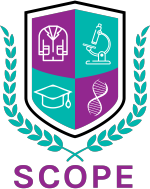
If you’re asking yourself, “I am confused about my career after 10th,” you’re not alone. Choosing the right career path can feel overwhelming, especially when faced with numerous options and societal expectations. For those who want to start working towards a career immediately, hands-on courses in the medical field offer an excellent opportunity. These programs provide practical training and job-ready skills, making them a perfect choice for students seeking clarity and direction.
At SCOPE College, we specialize in providing career-focused paramedical courses that set students up for success. Let’s explore how these courses can help you build a rewarding future.
Why Hands-On Careers Are Ideal After 10th
Hands-on careers emphasize practical skills and real-world applications. Unlike traditional academic paths, these careers allow you to enter the workforce sooner, often with lucrative opportunities. The medical field, in particular, offers a growing demand for skilled professionals in roles like lab technicians, radiologists, and nurses.
SCOPE College’s hands-on courses are tailored for students seeking immediate entry into the healthcare industry. These programs combine theoretical knowledge with practical training to ensure you’re job-ready upon graduation.
Courses Offered at SCOPE College
Diploma in Medical Laboratory Technology (DMLT)
This comprehensive program equips students with the skills needed to collect, test, and analyze biological samples. Laboratory technicians play a crucial role in diagnosing diseases and supporting doctors in treatment planning.
Learn more about paramedical courses after 10th.
Certificate Course in Radiology Technician
Radiology technicians are essential in modern healthcare, operating imaging equipment like X-rays and CT scanners. This course provides the technical expertise and practical training required to excel in diagnostic imaging.
Explore more about radiology courses after 12th.
X-Ray Technician
This specialized course focuses on X-ray technology, a key component of diagnostic processes. Graduates are equipped to handle X-ray machines and deliver accurate results for patient care.
Check out the top 10 medical careers without NEET.
Certificate Course in Medical Laboratory Technician
This program prepares students for entry-level positions in medical labs. From collecting samples to performing routine tests, students gain practical skills to excel in pathology labs.
Learn more about pathology courses after 12th.
Certificate Course in Dialysis Technician
As a dialysis technician, you’ll provide critical support for patients undergoing treatment for kidney-related conditions. This course offers in-depth training in operating dialysis machines and patient care.
Explore other paramedical courses after 12th.
Certificate Course in General Nursing Midwifery Assistant
This course is ideal for students passionate about patient care. It provides training in nursing assistance and midwifery care, preparing students for roles in hospitals and clinics.
Discover more about nursing courses after 12th.
Certificate Course in Operation Theatre Technician
Operation theatre technicians ensure that surgical environments are safe and well-prepared. This program trains students in sterilization techniques, equipment handling, and patient preparation for surgeries.
Learn about 1-year courses after 12th.
Certified MRI Technician
This course trains students to operate MRI machines and handle detailed imaging tasks critical for medical diagnoses. With extensive practical training, students gain the confidence to excel in healthcare.
Explore career options for girls after 10th.
SCOPE College: A Trusted Partner in Your Career Journey
Choosing the right institution is as important as choosing the right course. SCOPE College is a leader in paramedical education, offering unparalleled support to its students. Here’s why you should consider us:
1. Modern Lab Facilities
Our state-of-the-art labs ensure students gain hands-on experience with the latest medical equipment.
2. Global and Local Placements
We have a robust placement network that connects students with job opportunities worldwide.
3. Internships in Government Hospitals
Students benefit from real-world exposure through internships and on-the-job training in government hospitals.
4. 100% Job Placement Assistance
Our commitment doesn’t end at education; we provide comprehensive job placement support to all graduates.
5. Flexible Learning Options
Weekend batches and blended learning (online and offline) make our courses accessible to all students.
6. Financial Aid Support
We believe financial constraints should not be a barrier to education. SCOPE College offers various financial aid options.
7. Experienced Faculty
Our faculty consists of industry experts with years of experience, ensuring top-notch training for students.
Take the First Step Towards Your Career
If you’re confused about your career after 10th, SCOPE College is here to guide you. With our hands-on courses, state-of-the-art facilities, and robust placement support, you can confidently step into a rewarding career in the medical field.
Admissions Open Now: Don’t miss the opportunity to secure your future.
Contact Us Today: Get personalized guidance and start your journey.
Enroll Now: Take the first step towards a fulfilling career.
Your future starts here at SCOPE College—where hands-on learning meets real-world opportunities. Explore more about paramedical courses here.
Anyone interested in a practical, engaging career in healthcare, looking to make a direct impact on people’s lives right after their 10th standard, should consider these courses.
Most diploma and certificate courses take between 1 to 3 years to complete, depending on the program and institution.
Yes, there are ample job opportunities in hospitals, clinics, laboratories, and other healthcare settings immediately after completing these courses.
Absolutely. These courses can serve as a stepping stone to advanced degrees and specializations within the healthcare field, providing a solid foundation for further academic and professional development.
